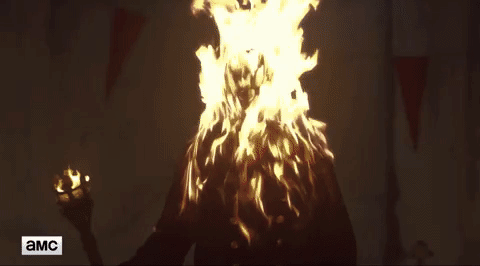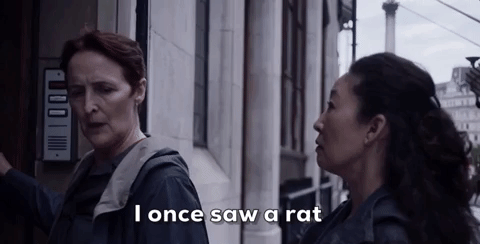No matter how hard some streaming shows have tried to subvert it, the television episode still lives. 2018 was full of contained, gripping, impeccable episodes of TV—some that even made our list of The 100 Best TV Episodes of the Century in July. There were episodes that perfectly encapsulated the ethos and missions of their respective series, that completely altered expectations and changed the way we think, and that defined the year in television. Below, Ringer staffers Andrew Gruttadaro and Miles Surrey list the best installments of TV this year.
10. “A Mercy,” The Terror
The Terror, AMC’s new horror series, did not derive its tension from the ultimate fate of its characters—as a supernatural, fictionalized account of two real-life British Royal Navy vessels that never returned from the Arctic, these men were certifiably doomed. Instead, what gave the series its bone-chilling, well, terror, was seeing how everyone slowly lost the hope of returning home before their own bodies gave way. (Or were torn apart by the Tuunbaq, a polar bear–like creature, whichever came first.) Still, these men cling to their optimism despite several setbacks, until everything falls apart in the sixth episode, “A Mercy.”
Captain Fitzjames (Tobias Menzies) organizes a carnival for the men: a final chance to let off some steam and boost morale before announcing they’re going to abandon the ships and set off on foot in search of help. It’s at this time that Dr. Goodsir (Paul Ready) discovers the group’s yearslong food supply has been tainted by lead, a revelation that snaps something in his usually reserved and arrogant superior, Dr. Stanley (Alistair Petrie). Dr. Stanley appears at the carnival after sealing off the entrances, and, having set fire to the food supply, self-immolates—much to his compatriots’ horror.

It’s frightening, especially after Dr. Stanley strikes a Christ-like pose before sinking into the snow. Indeed, his act of “mercy” was sparing the men a more horrific fate: that of slowly going insane, starving to death, or getting ripped apart by a monster. Most of the men eventually escape the fire, but at that point, they’ve lost all hope. For the remainder of the series, The Terror became The Walking Dead. —Miles Surrey
9. “Joe Pera Reads You the Church Announcements,” Joe Pera Talks With You
The simple summary of “Joe Pera Reads You the Church Announcements,” the sixth episode of comedian Joe Pera’s “a man grows in Buffalo” series on Adult Swim, is thus: A sheltered, quaintly Midwestern man hears the Who’s “Baba O’Riley” for the first time and promptly loses his mind. He calls every radio station in town to request it; he starts ringing handbells with untethered enthusiasm; he begins dancing, in the way old white men do, by bending their knees ever so slightly; he invites the pizza guy in; his basset hound scarfs down a full slice in the fracas; he doesn’t sleep for days and tries Starbucks for the first time; and he recounts all of this, as the episode title suggests, to his church’s congregation in the middle of Sunday Mass.
But the episode is much more than a quick, funny story about a man discovering the Who decades later. It’s a deft magic trick that captures the universal, unparalleled joy of consuming—and most importantly, sharing—art. It’s a meditation on the timelessness of the best parts of pop culture, and how the right song, or the right movie, can be life-affirming and unifying—the moment in which the church congregation joins Joe in singing “Baba O’Riley” is simple and funny, but also one of the most poignant moments on television this year. At just over 10 minutes, it’s a succinct, sneakily beautiful argument for why we watch, listen, and read. It’s also just a really good way to make some jokes about the Who. “Maybe I just don’t get it,” Joe says at the episode’s end. “But it seems like they realized they’d written the perfect song and then panicked, so then they added a violin solo.” Then he drives into a snowbank. —Andrew Gruttadaro
8. “The Planned Parenthood Show,” Big Mouth
Casting aside its many dick jokes—and a recurring subplot in which preteen boy Jay, voiced by Jason Mantzoukas, impregnates his pillow after humping it ad infinitum—Netflix’s Big Mouth carries a lot of crucial insights about puberty and the gross trials of encroaching adolescence. It is, in other words, the type of show I’d have loved to have had access to when I was a pimply 12-year-old, even though its material is just a little too vulgar for a classroom setting. Still, if there were ever a Big Mouth episode that deserves a place in contemporary sex education, it’s “The Planned Parenthood Show.”
With the messaging of an after-school special, but still packed with the same obscene humor of any regular episode, “The Planned Parenthood Show” deals with the many misconceptions of the eponymous facility and what services it provides. In short, Planned Parenthood is not just an “abortion factory,” as Jay initially describes it. The Planned Parenthood skits the kids imagine for the various services are hilarious in concept—the episode highlight: a Bacheloresque show for teenage Leah (Kat Dennings) to choose the right contraceptive that includes the dreaded “pull-out” method—while remaining informative. Even the perpetually moronic Coach Steve (Nick Kroll) sees the light. “I think I understand Planned Parenthood now. They do medicine for your bathing-suit parts.” And if Coach Steve can get why Planned Parenthood is important—note: He eats the gum stuck under the gym’s bleachers because he likes its unique flavor—well, anyone else should too. —MS
7. “Lone Star,” Trust
The FX miniseries’ greatest strength—that its 10 episodes assume different points of view to provide a clearer picture of what went down during the infamous John Paul Getty III kidnapping in the 1970s—was sometimes its biggest weakness. On an episodic basis, Trust is only as good as the character who leads it. Thankfully, the series’ second episode, “Lone Star,” lets Brendan Fraser take the wheel, so it’s pretty great.
Fraser plays James Fletcher Chace, the man oil tycoon J. Paul Getty hires to help retrieve his grandson in Italy, who is a far cry from Mark Wahlberg’s middling portrayal of the same man in Ridley Scott’s All the Money in the World. Fraser, for starters, wears a cowboy hat—[whispers] he’s from Texas—breaks the fourth wall like he’s Deadpool, and chugs a giant jug of milk in the back of a car. We follow Chace in Italy as he traces the missing Getty grandson’s steps, “Lone Star” becoming a micro-procedural within the show itself. Whereas it’s difficult to connect with members of the Getty family, who are so rich and out of touch they might as well be from another planet, Chace feels like the kind of guy you’d want to hang with at a bar (hopefully he’s not drinking milk) and just listen to him tell stories with that soothing Southern drawl. Much of Chace and the episode’s effectiveness relies on Fraser, who exudes the same natural charisma that made him a beloved, not-too-serious blockbuster lead in the ’90s with movies like The Mummy. And knowing why the actor receded from the spotlight, thanks to a revealing GQ profile earlier this year, makes Fraser’s mini-renaissance in Trust all the more rewarding. —MS
6. “Week 10: Season Finale,” The Bachelor
On most other shows, repetition is a bad thing, but on The Bachelor, it is a feature rather than a bug. Each season (there have been 22 of them now) starts the same way and ends the same way—with basically everything in the middle the same as well, minus small details. The predictable formula provides comfort and a level of tragic irony, in which you know what’s going to happen before the characters do. You know that the girl who makes enemies in the Bachelor mansion will pay for her crimes, and that the Bachelor will inevitably just choose the girl he finds to be the prettiest. And you know that the closing minutes of a finale of The Bachelor will feature a proposal and, likely, an engagement. Repetition is why the Season 22 finale of The Bachelor is the best episode the show has ever aired, and one of the best episodes of TV this year: Because Arie Luyendyk Jr. proposed to Becca Kufrin, and she said yes, with about 20 minutes left in the finale. Keen viewers rightly wondered why so much time was left, as a delicious sort of doom set in.
No one could have been prepared for what came next. First, a vacation video of Arie and Becca cooking together and making out in a hammock was followed by the former confessing that he’d picked the wrong woman. And then it became clear that Arie (and the producers of The Bachelor) had tricked Becca into traveling to Los Angeles so that she could be dumped on camera. And then he began to do it, as Becca began to realize he was doing it. (“Are you fucking kidding me?” she asks repeatedly.) It’s the most devastating, honest moment in Bachelor history.
Much of that is due to how the show decided to present the breakup—relatively uncut and in split-screen, with one camera each following Arie and Becca, preserving a sense of realism while emphasizing the evil ludicrousness of Arie’s actions and how insufferably long the confrontation was. The episode is great not only for its salaciousness, but for its rawness, and most importantly, for the way it—inadvertently or not—challenged viewers to ponder the morality of watching The Bachelor. —AG
5. “The Queen,” Castle Rock
What type of show is Castle Rock? I’ll give you a hint: Type in “Castle Rock ending explained” on Google, and you’ll find several entertainment outlets providing substantive breakdowns of its enigmatic final moments. (I have no idea what happened.) Castle Rock is Stephen King by way of puzzle-box storytelling—yet its best episode, “The Queen,” strips away the labyrinthian plotting to focus on a tragic love story and a fractured mind.
Ruth Deaver (Sissy Spacek) experiences something that seems like dementia, and throughout the series she’s in a perpetual daze. After six episodes, “The Queen” finally lets us see things from Ruth’s perspective. Much like Lost’s “The Constant,” the episode is actually unstuck in time, as Ruth is doomed to revisit the many instances of emotional abuse by her dead husband, but also moments of intimacy with Sheriff Alan Pangborn (played by Scott Glenn in the present timeline), who becomes her partner later in life. Ruth uses chess pieces scattered around the house as “bread crumbs” to help her posit what’s real and what’s from the past. By the end of the episode, however, she knowingly clings onto an old memory of Alan, afraid to come to terms with his tragic, present-day circumstances. That this scene is scored by Max Richter’s “On the Nature of Daylight” only heightens its tear-inducing pathos. Coshowrunner Sam Shaw dedicated the episode to his late mother, which is not just a moving tribute, but some of the finest King-related storytelling ever conceived. —MS
4. “Loud, Fast, and Keep Going,” Barry
Throughout Barry, Bill Hader and Alec Berg’s dark HBO comedy, the titular hitman turned wannabe-actor often dreams of a better life. He’s with his acting school crush, living in a big house, grilling with Jon Hamm. The audience also got to dream throughout Barry: about how Barry might be able to escape the dead-end life of killing for hire; about how he might actually be a good person.
“Loud, Fast, and Keep Going” is the moment when you can no longer dream, and the moment when Barry separates itself from other shows centered on antiheroes. “I know you’re not gonna do anything crazy. I know you’re a good guy,” Barry’s Marine buddy tells him, just before Barry ruthlessly executes him. The episode is a devastating, irrevocable twist that sucks out every ounce of joy built up by Barry’s earlier, more delightful episodes, leaving only a feeling of hollowness. It reveals that Barry is not a show about an antihero. It’s a show about a tragically terrified man capable only of self-preservation. —AG
3. “Nice Face,” Killing Eve
Killing Eve is a tricky series to categorize: It racks up a decent body count, as hired killer Villanelle (Jodie Comer) murdering people across Europe without remorse or a modicum of empathy. She’s more than a bit terrifying! But Killing Eve also has a dry, acerbic wit that immediately establishes itself in the pilot, “Nice Face,” perhaps best summarized by an exchange between Eve (Sandra Oh) and her new British intelligence boss, Carolyn (Fiona Shaw), before they enter a secret spy headquarters:

This might be my favorite line of the year. It’s such a weird and random observation, the first of many sparks of mundanity (see: the cheese puff exchange in the finale) sprinkled in with deadly consequences that set up Killing Eve as unlike any spy drama before it. As Eve and Villanelle draw themselves closer together in the pilot, Eve unknowingly meets Villanelle in a public restroom; the killer tells her rival that she looks better with her hair down, before more bodies are discovered. And with that—hair advice!—the strangest, most entertaining cat-and-mouse dynamic on television was born. No wonder Killing Eve became one of the biggest word-of-mouth sensations in years. —MS
2. “Prague,” Succession
It isn’t easy to pick one episode from the first season of Succession, HBO’s bleakly funny series about a media conglomerate and the absurdly wealthy family who runs it. There’s the boardroom warfare of “Which Side Are You On?” that finally kicks the show into a groove; there’s the devastating chaos of the season finale. But “Prague”—an episode that doesn’t actually take place in Prague, but in a dilapidated Brooklyn warehouse turned elite nightclub—is the episode that best distills what Succession is really about: a group of ridiculously unhappy rich people excessively and obsessively indulging in things that will only make them unhappier.
At what is technically Tom Wambsgans’s (Matthew Macfadyen) bachelor party, his soon-to-be brother-in-law Kendall Roy (Jeremy Strong) snivels around trying to invent new ways to screw over (read: impress) his father; Roman Roy (Kieran Culkin) spends the entire episode trying to nail down the facts about just how consensual his time spent in a dog crate as a child was; Cousin Greg (Nicholas Braun), ever the slave to the demands of his relatives, does a mountain of cocaine so that no one else can; worst of all, Tom swallows his own semen, mostly because he thinks everyone will be impressed by it (they aren’t). It’s all extremely stupid, petty, and gross. Which, rather delightfully, is exactly what Succession is. —AG
1. “Teddy Perkins,” Atlanta
Darius (Lakeith Stanfield) goes to buy a piano. Technically speaking, that’s the log line of the sixth episode of Atlanta’s second season. To fill that in with a little more detail, though: Darius goes to buy a piano, and in doing so stumbles into a house of horrors inhabited by a decrepit, barely human man named Teddy Perkins (played terrifically—and sneakily—by Donald Glover), who has more than a few daddy issues, snacks on ostrich eggs, and eventually tries to kill Darius. I could keep adding in details—Teddy’s surreal note-to-self machine, the faceless mannequin, the brother in the basement—until I gave myself carpal tunnel, but no number of words will be able to capture watching “Teddy Perkins.”
To say that Atlanta got darker in its second installment would be an understatement. The chapter—which was subtitled “Robbin’ Season”—carried an ominous tone throughout, as if ghosts were lurking just behind Earn, Alfred, Darius, and Van. Relationships decayed, wounds were reopened, and Paper Boi’s growing fame proved to be profoundly incapable of filling these voids.
“Teddy Perkins” was the centerpiece of this overall tone, a verifiably dark, legitimately haunting, disorienting, and altogether unexpected episode of television. And within this tone, the episode deftly explored both the necessity of pain in the creation of art and the idea that we all inherit scars from our parents. (“Teddy Perkins” is perhaps, in more ways than one, a rumination on Michael Jackson.) Is art great only if it has sprouted from immense hurt? And is greatness enough to justify the pain inflicted to achieve it? Before “Teddy Perkins” devolves into a classic horror climax, it asks these questions—and forces us to reconsider the ways in which we as a society have championed the sacrifice of humanity in the race for supremacy. “Great things come from great pain,” Teddy tells Darius, just before unveiling a damning list of names who seem to ascribe to this theory: “My father, Joe Jackson, Marvin Gaye Sr., Tiger Woods’s father, Serena Williams’s father …”
A terrific episode of television that is equal parts dark humor, sincere horror, and profound philosophy. Only Atlanta could do this. —AG
Disclosure: HBO is an initial investor in The Ringer.

